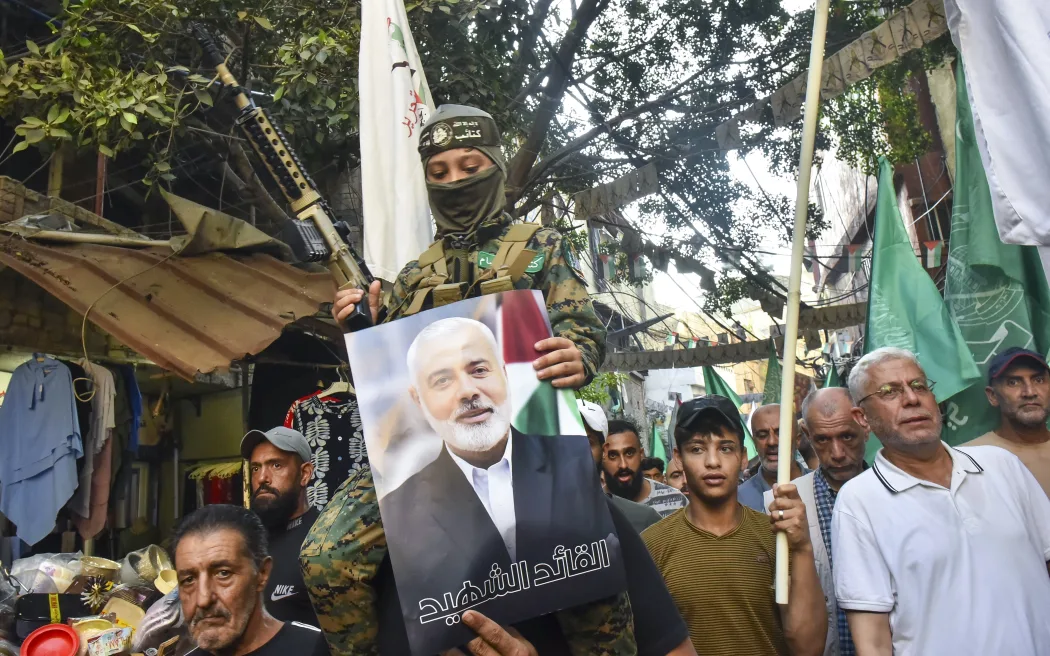
Fears of reprisals arise after the death of the head of Hamas in Iran
Ismail Haniyeh, the leader of Hamas, was assassinated early on Wednesday morning in Tehran, the capital of Iran. The attack sparked promises of retaliation against Israel and increased fears that the Gaza conflict was escalating into a larger Middle East war.
Haniyeh’s demise was verified by Iran’s Revolutionary Guards and the militant Palestinian Islamist Hamas. It happened hours after he attended Iran’s new president’s swearing-in ceremony, according to the Guards.
Even though it was widely believed that Israel was responsible for the attack on Haniyeh, Prime Minister Benjamin Netanyahu’s administration refused to take responsibility and declared it would not comment on the death.
Senior Hamas official Khalil Al-Hayya told a news conference in Tehran that Haniyeh was killed by a missile that hit him “directly” in a state guesthouse where he was staying, citing witnesses who were with Haniyeh.
Typically stationed in Qatar, Haniyeh served as the public face of Hamas’s diplomatic efforts abroad while the Gaza war, which was sparked by the organization’s attack on Israel on October 7, went on. He has been involved in indirect negotiations for a truce in the Palestinian enclave, mediated by the international community.
In a televised message on Wednesday night, Netanyahu did not address Haniyeh’s death, but rather stated that Israel has recently dealt severe blows to Iran’s proxies, such as Hamas and Hezbollah, and that Israel would retaliate violently against any attack.
“We will be united and resolute in the face of any threat, and we are ready for anything. Any aggression against us, from any source, would come at a terrible price from Israel,” he declared.
The most recent developments seem to be undermining the likelihood of an impending ceasefire in the nearly ten-month-old conflict in Gaza between Israel and Hamas, which is supported by Iran.
In a statement, the armed wing of Hamas said that Haniyeh’s death would “take the battle to new dimensions and have major repercussions”. Iran announced three days of national mourning, vowed to respond, and blamed the U.S. for its support of Israel.
Thousands of supporters of the Palestinian cause marched through central Istanbul late on Wednesday to express their outrage over Haniyeh’s death in Turkey.
Adorning posters featuring Haniyeh’s picture, demonstrators in Istanbul’s Fatih neighborhood shouted “murderer Israel, get out of Palestine” and brandished Turkish and Palestinian flags.
Washington voiced worries about the possibility of things getting worse. However, according to White House national security secretary John Kirby, the United States was taking steps to stop it from happening and did not view that as imminent or inevitable.
The risks “are undoubtedly higher at this time. He told reporters, “They don’t make the goal of de-escalation, deterrence, and dissuasion any less complicated.”
United and Delta, two American airlines, suspended service to Tel Aviv, and the United States encouraged its people not to travel to Lebanon.
Less than a day had passed since Israel declared it had eliminated Hezbollah’s highest-ranking military commander in retribution for a lethal rocket attack in the Israeli-occupied Golan Heights.
Hezbollah verified that an Israeli airstrike in a Beirut suburb claimed the life of senior military commander Fuad Shukr.
Lebanese network Tele Liban reported on Wednesday that seven people were killed and 78 injured in the Beirut strike, citing the civil defense administration. One of the fatalities, according to Iranian official media, was an Iranian military aide.
‘HARSH PUNISHMENT’ ISRAEL INVITES, SAYS KHAMENEI
Ayatollah Ali Khamenei, the Supreme Leader of Iran, declared that Tehran has a duty to exact revenge on Israel for providing the justification for “harsh punishment for itself” in the killing of Haniyeh. Early in the Gaza War, Israeli targets were directly attacked by Iranian forces.
According to observers and Hamas insiders, Haniyeh’s deputy-in-exile, Khaled Meshaal, who resides in Qatar, is the most likely candidate to succeed him.
Speaking to reporters, Israeli government spokesman David Mencer stated that Israel was dedicated to negotiating a truce in Gaza and obtaining the release of Israeli captives detained by Palestinian militants there.
While in Singapore, U.S. Secretary of State Antony Blinken avoided answering a question about Haniyeh’s death, stating that a ceasefire agreement in Gaza was essential to preventing a wider regional escalation. He stated to Channel News Asia that neither the United States of America nor its agents were aware of the murder.
Qatar, which has been mediating negotiations to end the conflict in Gaza alongside Egypt, denounced Haniyeh’s murder.
“How can mediation succeed when one party assassinates the negotiator on other side?” Sheikh Mohammed bin Abdulrahman Al Thani, the prime minister, stated on X.
Remarking that the ceasefire process had not been “completely torpedoed,” Kirby stated in Washington that “we still believe the deal on the table is worth pursuing.”
After fighters headed by Hamas killed over 1,200 people in southern Israel on October 7 and kidnapped nearly 250 more, Israeli counts indicate that Israel began its offensive in Gaza.
More than 2 million people are facing a humanitarian crisis as a result of Israel’s bombardment in the coastal enclave, which has killed over 39,400 people in almost ten months, according to Gaza health officials.
Though Israel was in high spirits, people in confined Gaza feared Haniyeh’s passing would extend the fighting.
“This is frightening news. We consider him to have been like a father to us,” Hachem Al-Saati, a Palestinian of Gaza, said.
All Categories
Recent Posts
Tags
+13162306000
zoneyetu@yahoo.com



